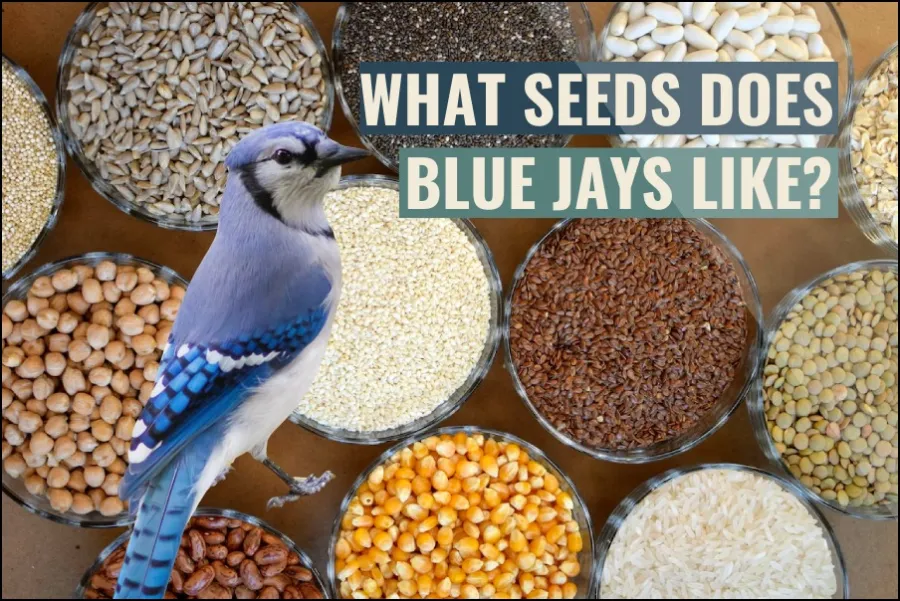
Blue jays are a common sight at backyard feeders, and they have a diverse diet that includes seeds and grains. In this article, we’ll take a look at 11 seeds and grains that blue jays are known to love and the nutritional benefits they provide.
Blue jays eat seeds like sunflower, peanuts, safflower, millet, buckwheat, nyjer, cracked corn, oats, wheat, and sorghum. They also eat fruits, insects, nuts, and small vertebrates. Seeds provide energy and nutrients. Blue jays may eat different seeds depending on region and season.
We’ll take a look at the nutritional benefits of each seed and how they can be incorporated into a blue jay’s diet. Whether you’re a birdwatcher or just enjoy feeding birds in your backyard, this article will provide you with valuable information about the seeds that blue jays love.
Sunflower seeds
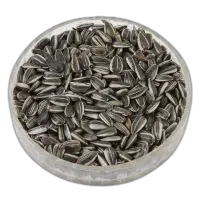
Sunflower seeds are a popular food for many types of birds, including blue jays. They are high in protein, fat, and other nutrients, making them an excellent source of energy for birds. Sunflower seeds can be found in a variety of forms, including whole, hulled, and oil-roasted. They can be offered to blue jays in a feeder, on a tray, or scattered on the ground. Sunflower seeds are high in protein, fat, and other nutrients, making them an excellent source of energy for birds. A 100-gram serving of sunflower seeds contains approximately 584 calories, 20.2 grams of protein, and 50.2 grams of fat. They are also a good source of fiber, vitamins, and minerals, including vitamin E, vitamin B6, and magnesium.
Peanuts

Peanuts are a type of legume that are often offered to blue jays as a source of food. They are high in protein and fat, which makes them an excellent source of energy for birds. Peanuts can be offered to blue jays in a feeder, on a tray, or scattered on the ground. It’s important to note that peanuts should be offered in a form that is safe for birds to eat, such as whole, unsalted peanuts or peanuts that have been specifically prepared for use as birdseed. Peanuts are high in protein and fat, making them an excellent source of energy for birds. A 100-gram serving of peanuts contains approximately 567 calories, 25.8 grams of protein, and 49.2 grams of fat. They are also a good source of fiber, vitamins, and minerals, including niacin, vitamin E, and magnesium.
Safflower seeds
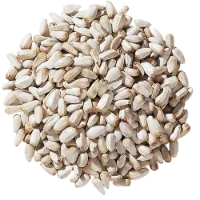
Safflower seeds are a type of seed that is often used as a birdseed mix, and blue jays will eat them along with other seeds. Safflower seeds are high in protein and fat, making them an excellent source of energy for birds. They are also relatively low in oil, which makes them less attractive to some types of birds that are prone to getting fat, such as house sparrows and European starlings. Safflower seeds can be offered to blue jays in a feeer, on a tray, or scattered on the ground. Safflower seeds are high in protein and fat, making them an excellent source of energy for birds. A 100-gram serving of safflower seeds contains approximately 534 calories, 19.9 grams of protein, and 39.9 grams of fat. They are also a good source of fiber, vitamins, and minerals, including vitamin E, vitamin B6, and magnesium.
Millet
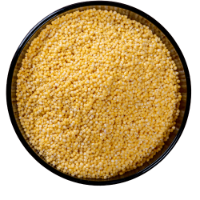
Millet is a small, round grain that is often included in birdseed mixes and can be eaten by blue jays. It is a good source of energy for birds, and it is also relatively low in fat. Millet can be offered to blue jays in a feeder, on a tray, or scattered on the ground. It’s important to note that there are several different types of millet, including white, red, and golden millet, and each type has slightly different nutritional properties. Millet is a good source of energy for birds and is relatively low in fat. A 100-gram serving of millet contains approximately 367 calories, 11.3 grams of protein, and 2.6 grams of fat. It is also a good source of fiber, vitamins, and minerals, including niacin, vitamin B6, and magnesium.
Buckwheat
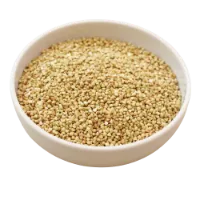
Buckwheat is a small, triangular seed that is often fed to birds, including blue jays, as a way to provide them with a high-energy food source. It is high in protein and relatively low in fat, making it a good choice for birds that need a lot of energy but don’t want to consume too much fat. Buckwheat can be offered to blue jays in a feeder, on a tray, or scattered on the ground. Buckwheat is high in protein and relatively low in fat, making it a good choice for birds that need a lot of energy but don’t want to consume too much fat. A 100-gram serving of buckwheat contains approximately 343 calories, 12.5 grams of protein, and 2.6 grams of fat. It is also a good source of fiber, vitamins, and minerals, including niacin, vitamin B6, and magnesium.
Nyjer seeds
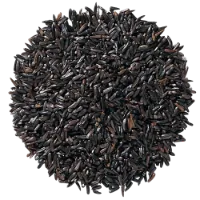
Nyjer seeds, also known as thistle seeds, are tiny, black seeds that are often used in special feeders designed for finches, but blue jays may also eat them. They are high in oil, which makes them an excellent source of energy for birds. Nyjer seeds can be offered to blue jays in a feeder specifically designed for these seeds, as they are too small to be offered in a standard feeder. Nyjer seeds are high in oil, making them an excellent source of energy for birds. A 100-gram serving of nyjer seeds contains approximately 547 calories, 21.5 grams of protein, and 48.8 grams of fat. They are also a good source of fiber, vitamins, and minerals, including vitamin E, vitamin B6, and magnesium.
Cracked corn
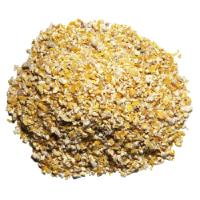
Cracked corn is a type of corn that has been split or broken into smaller pieces, making it easier for birds like blue jays to eat. It is a good source of energy for birds and is often included in birdseed mixes. Cracked corn can be offered to blue jays in a feeder, on a tray, or scattered on the ground. Cracked corn is a good source of energy for birds and is often included in birdseed mixes. A 100-gram serving of cracked corn contains approximately 364 calories, 10.6 grams of protein, and 4.7 grams of fat. It is also a good source of fiber, vitamins, and minerals, including niacin, vitamin B6, and magnesium.
Oats
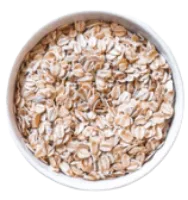
Oats are a type of grain that are often included in birdseed mixes and can be eaten by blue jays. They are a good source of energy for birds and are relatively low in fat. Oats can be offered to blue jays in a feeder, on a tray, or scattered on the ground. It’s important to note that oats should be offered in a form that is safe for birds to eat, such as whole oats or oats that have been specifically prepared for use as birdseed. Oats are a good source of energy for birds and are relatively low in fat. A 100-gram serving of oats contains approximately 389 calories, 16.9 grams of protein, and 6.9 grams of fat. They are also a good source of fiber, vitamins, and minerals, including niacin, vitamin B6, and magnesium.
Wheat
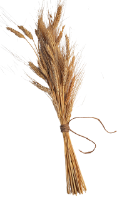
Wheat is a type of grain that is often included in birdseed mixes and can be eaten by blue jays. It is a good source of energy for birds and is relatively low in fat. Wheat can be offered to blue jays in a feeder, on a tray, or scattered on the ground. Wheat is a good source of energy for birds and is relatively low in fat. A 100-gram serving of wheat contains approximately 343 calories, 13.2 grams of protein, and 2.5 grams of fat. It is also a good source of fiber, vitamins, and minerals, including niacin, vitamin B6, and magnesium.
Sorghum
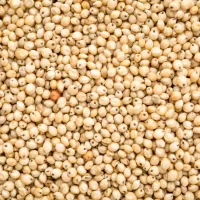
Sorghum is a type of grain that is often used in birdseed mixes and can be eaten by blue jays. It is a good source of energy for birds and is relatively low in fat. Sorghum can be offered to blue jays in a feeder, on a tray, or scattered on the ground. Sorghum is a good source of energy for birds and is relatively low in fat. A 100-gram serving of sorghum contains approximately 345 calories, 10.7 grams of protein, and 1.7 grams of fat. It is also a good source of fiber, vitamins, and minerals, including niacin, vitamin B6, and magnesium.
In conclusion
Blue jays are a common sight at backyard feeders and have a diverse diet that includes seeds and grains. In this article, we’ll look at 11 seeds and grains that blue jays love, including sunflower seeds, peanuts, safflower seeds, millet, buckwheat, nyjer seeds, cracked corn, oats, wheat, sorghum, and flax seeds. These seeds provide a range of nutrients that can help blue jays thrive, including protein, fat, fiber, vitamins, and minerals. Sunflower seeds, for example, are high in protein and fat, while millet is a good source of energy that is relatively low in fat. Buckwheat is high in protein and relatively low in fat, making it a good choice for birds that need a lot of energy without consuming too much fat. Nyjer seeds are high in oil, making them an excellent source of energy for birds. Cracked corn is a good source of energy that is often included in birdseed mixes. Oats are a good source of energy that is relatively low in fat, while wheat is a good source of energy that is also relatively low in fat. Sorghum is a good source of energy that is relatively low in fat, and flax seeds are high in omega-3 fatty acids and are a good source of energy for birds. In addition to seeds, blue jays also eat fruits, nuts, insects, and small vertebrates. Seeds are excellent foods for caching, which bluejays do annually before winter. Check out how you can help bluejays with caching here.
